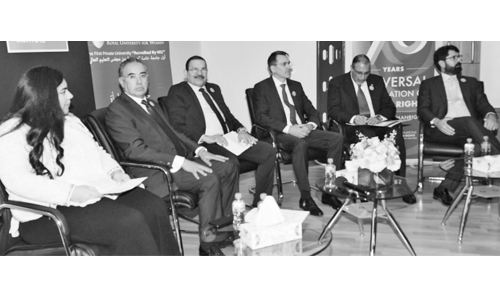Women ‘should occupy strategic positions for real empowerment’
Marking the 70th anniversary of the United Nations Declaration of Human Rights (UNDHR), the Royal University for Women (RUW), in collaboration with the United Nations (UN) in Bahrain, National Institute for Human Rights (NIHR), International Peace Institute, Middle East and North Africa ( IPI MENA) and the German Embassy, held a forum to highlight the importance of the UDHR, its legacy and its values as a platform for raising awareness on human rights laws and policies at a national, regional and international levels.
Speaking at the forum, IPI MENA Director Nejib Friji called on women and youth at the Royal University for Women (RUW), to proactively take up leadership positions. The forum held at the RUW Campus Auditorium with an objective to contribute and expand on the knowledge of the UDHR through educational platforms, further emphasised on the fundamental value of the UDHR in the development of human rights laws and highlight the contemporary value of the UDHR in inspiring sustainable development of the society and global peace through the rights-based development approach. “Spreading knowledge and awareness of the UDHR amongst the youth constitute the main antidote to extremism, radicalism and intolerance.
It represents a fundamental step to inculcate in the new generations values such as dialogue, respect and tolerance,” Mr Friji added. The UDHR is a milestone document, which underpins all international human rights laws. It inspires new generations to build on it, so all peoples can live in freedom, equality and dignity, he observed. The UDHR was drafted 70 years ago by representatives of major UN by men and women from member states with different legal and cultural backgrounds from various parts of the world, it was proclaimed by the United Nations General Assembly in Paris in 1948.
Available in more than 500 languages, it is the most translated document in the world. Opening the forum, Dr Pasquale Borea, Dean of the College of Law at RUW, stressed on the educational value of the declaration as a successive international legal instrument echoed across regional conventions, national legislation and instruments of soft law. United Nations Resident Co-ordinator Amin El Sharkawi pointed out, “The roles of Hansa Mehta of India, Minerva Bernardino of the Dominican Republic and Begum Shaista Ikramullah of Pakistan, as prime examples of key female players who fundamentally transformed the UDHR to encompass women.”
Putting forward examples of the German Federal Government in urging companies to implement human rights, German Ambassador to the Kingdom of Bahrain Kai Boeckmann stressed the private sector’s responsibility in upholding and promoting human rights. Noting the International Holocaust Remembrance Day on 27 January 2019, Mr Boeckmann pointed to the achievements of the international community in working together against the mass violations of human rights. “The participation of women and youth are two interconnected and integral players to the sustainable development and peacefulness of a society, as crucial in resonating with the 2030 Agenda’s pledge to ‘leave no one behind.’
“We need to resolutely defend all that we have achieved, where incorporating women and youth to build on the legacy of the UDHR can serve as a focal point for civil society organisations, national human rights institutions and private sector to engage in dialogue on this front and help shift from a culture of crisis management to one of prevention,” IPI MENA Programme Assistant Dalya Al Alawi told Tribune. Abdulla Ahmed Alderazi, Vice Chairperson of the NIHR’s Council of Commissioners, reminded citizens and civil society of their duties to uphold human rights and stressed the importance of Article 29 of the UDHR.
In attendance were parliament representatives, the private sector, diplomatic corps, students, media and the first female judge in the Kingdom of Bahrain, Mona Al Kawari. Following the forum, a debate took place where the private sector and female students interacted actively, on their roles to take ownership of their rights, and the ways forward to build on the legacy of the UDHR.
Related Posts

